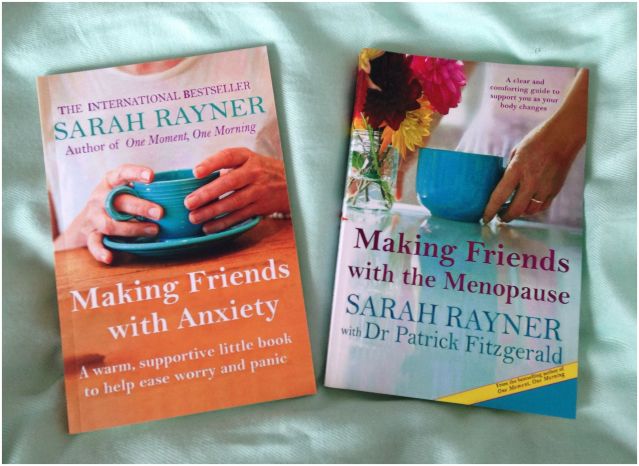Anxiety
Why the Menopause Creates a Perfect Storm for Anxiety
How fluctuating hormones can lead to mood swings, anxiousness, and depression.
Posted March 21, 2015 Reviewed by Ekua Hagan

Whilst I don't know your exact age, dear blog reader, my guess is you're not an adolescent. So I’m going to start by asking you to cast your mind back...
Do you remember how — if you were anything like me — you veered from anger and despair to laughter and happiness on an almost hourly basis as a teenager? Your first kiss, your first holiday without your parents, the first time you fell in love, your first driving lesson? These experiences are often burned into our memory, so intense were our feelings then.
Whilst other factors can contribute to adolescent volatility, it’s nonetheless the case that our reproductive hormones have a profound influence on our bodies and behaviour, and it’s only when the brakes on estrogen and testosterone are released that girls and boys begin to morph into adults. Yet although we’re accustomed to seeing teenagers as the embodiment of hormonal mayhem, what’s less widely acknowledged is that the female body undergoes enormous chemical changes as a result of the menopause, and that this can also have a big an impact on our emotions, too. In other words...
...welcome to being a teenager again

Of course I’m not your doctor, or your psychiatrist, and there can be other physical causes of low mood than our fluctuating reproductive hormones. Thyroid issues also affect how we feel emotionally, for example, and can occur at any age.
Nonetheless, if you’re at that time of your life (usually in your late forties or early fifties) when your periods are becoming erratic and you feel more anxious, depressed, angry or irritable than before, the odds are your more intense emotional state is connected to changes going on physically. Same — or similar — to adolescence, then. Only in our teens the brakes were coming off our reproductive hormones; however, in the run up to menopause (known as ‘perimenopause’) they are coming on.
Unfortunately, when I was perimenopausal, I was unaware of the power of my hormones. My problem was anxiety — and my goodness, was it overwhelming. So overwhelming that I had to cease work, I couldn’t drive or socialize, and on many occasions, I felt as if was pinned to the floor by panic.
For other women, the black dog of depression might bite at this time. Both are debilitating and distressing, and — especially if you’ve not suffered problems with your mental health hitherto — frightening. There’s little more horrific an experience than losing the very sense of who you are. Other women may become irritable and suffer sudden bursts of rage, experience memory loss, and have difficulty concentrating, or a combination of these.
In my case, ignorance was not bliss; I grew more and more anxious. Eventually, I got so desperate that I consulted a psychiatrist. Yet, when I asked whether he thought my age (49) might have anything to do with how panicky I was feeling, he said that it was ‘unlikely’, pointing out that I had a history of being anxious. I told him my anxiety had got much worse, and I believed I was going through the menopause. ‘My antidepressants don’t seem to work like they used to,’ I said. (I’d been on a maintenance dose for many years.) He agreed it was possible that they’d lost their efficacy and we switched my medication, which helped.
Research shows panic disorder is more common around menopause
At the time, I believed the psychiatrist knew best because he was an expert, but now I’m more or less out the other side of the menopause, my moods have stabilized. This seems more than a coincidence, so I looked into it more closely in order to research my new book on the menopause, and lo, I’ve discovered that panic disorder is common at this time.
Stacey B. Gramann, Psychiatry Resident at the University of Massachusetts, reports in a survey of nearly 3,500 women aged 50-79 years, that panic attacks were most common among women in the menopause. It’s a similar story with depression: Investigators from the Harvard Study of Moods and Cycles recruited premenopausal women aged 36-44 years with no history of major depression. They then followed up these women for nine years to detect new onsets of major depression and — bingo! According to Gramann, they found that women who entered perimenopause were twice as likely to have clinically significant depressive symptoms as women who were as yet not perimenopausal.
So if I were sitting opposite you, dear blog reader, in a psychiatric consultation and you asked if the menopausal transition could be contributing to your fluctuating mood, I’d say, ‘Yes, certainly.’ There might be other contributing factors, but perimenopausal mood swings and crashes are also often linked to fluctuating estrogen and progesterone levels.
Frankly, I wish the psychiatrist had said to me that there was a link back then. It would have been comforting to know many women have felt the way I did during perimenopause and that I was thus ‘normal’. At the time, my biggest fear was that my anxiety was going to be permanent, and this would have given me hope that it might not be. It’s also possible I might have opted for HRT instead of altering the antidepressants. I doubt it, but it would have been good to have given the option consideration.

First, let's mix up our reproductive hormones...
I now appreciate that a shift in hormone balance can create stress throughout your entire body, and that several so-called psychological symptoms of the menopause can be attributed to the known reduction of blood flow to the brain as estrogen deprivation causes blood vessels to constrict. The result is clumsiness, a reduced reaction time, and a lack of ability to judge distance, along with a woolly "out of body" feeling.
In addition, along with lowering estrogen, reducing progesterone is one of the hallmarks of our ovaries shutting down. Progesterone acts as a natural sedative, softening and balancing the effects of estrogen and promoting sleep. Because progesterone is a woman’s ‘calming’ hormone, with less of it around, it makes complete sense that we may feel more overwhelmed and easily stressed, anxious, edgy, and short-tempered. In many women, this leads to symptoms such as tension headaches, palpitations, digestive issues and more – and, in some cases, full-blown panic disorder.
...then let's add a few life crises...
To make this chemical concoction even more potent, alongside your body changes, you may well be experiencing other life events around the time of perimenopause which can exacerbate anxiety. As I turned 50, I found myself dealing with a father with dementia and providing a home for my teenage stepson, for instance — and I’ll bet many readers can insert different personal stressors here.
Everyone experiences anxiety at some point, but when it becomes out of proportion, persistent, or appears for no apparent reason, it can become a problem. You may well already know this — if not you’ll find a fuller explanation in my earlier blog post here — but when we are anxious, the stress hormone adrenaline is triggered as part of the "fight or flight" response. This response is designed to protect us from danger and is totally natural biologically.
So really, anxiety only becomes a problem when we don’t actually need to run away or fight for survival. To experience rising anxiety in a situation where we tell ourselves we "should" feel perfectly fine only makes us confused and angry with ourselves. Sometimes, if we experience waves of panic in an unexpected environment, such as in a supermarket or business meeting, it can be truly terrifying.
...and a whole load of adrenaline
When my anxiety was really, really bad, I fought it tooth and nail. Often I’d think I’d do anything to get rid of it, sometimes I’d even shout "get out of my head!" and beat my own forehead. Ironically, this only triggered more adrenaline and made my anxiety worse, although I didn’t appreciate it at the time.
If you’re hyper-anxious, it’s unlikely you’ll be able to settle down until the adrenaline subsides, but as I explain more fully in both my Making Friends books, the main secret to overcoming anxiety is not to fight it. We need fear, however horrible it feels to be afraid.
Once I realized I couldn’t switch anxiety off, however desperately I wanted to, because it was inextricably linked to fear and the production of adrenaline, it helped me change my attitude. Gradually, I began to appreciate anxiety was what had kept me alive. It was the start of making friends with my own anxiety and the beginning of my road to recovery, a journey I continued when I learned about the hormones involved in the menopause.
Of course I still experience anxiety and I always will. But when I’m caught in the middle of the maelstrom, knowing it's got perfectly normal and natural biological roots helps. I hope it helps you, too.





